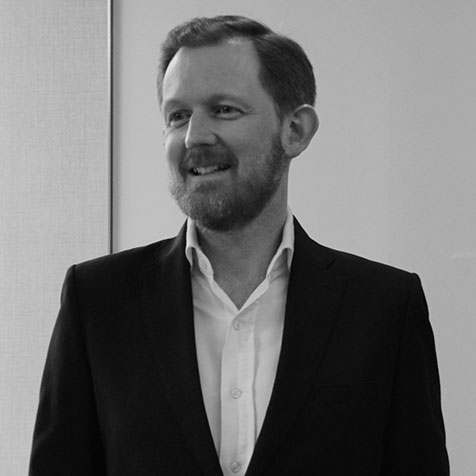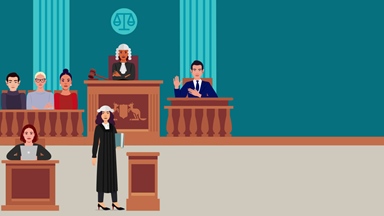Loading component...
At a glance
The courtroom cross-examination process can prove challenging to even the most seasoned and professional expert witnesses.
Dean Newlan CPA, senior consultant at McGrathNicol and co‑lead of the firm’s Financial Crime Exchange, describes the experience as “nerve-wracking”.
A forensic accountant with more than 30 years of experience, Newlan has delivered expert testimony on the witness stand about six times throughout his career, as most of the cases he works on settle out of court. He says it is never easy to have your credibility questioned, but when it comes to giving expert testimony in court, it is just part of the job.
“When you’re giving evidence-in-chief, it’s usually straightforward and may go for as little as 15 minutes,” says Newlan.
Evidence-in-chief refers to a witness being questioned in court by the party that called them to appear.
“When you’re cross-examined on the report, however, that’s when the ‘fun’ starts. Counsel for the other side may have engaged a forensic accountant of their own to question the methodology and assumptions used in your report with the aim of challenging the credibility of your findings and opinions.
“The best way to handle cross‑examination is to have been intimately involved in preparing the report, to know your report thoroughly, to answer the questions put to you as simply as possible and to be completely independent of the client who engaged you.”
Experts in demand

As the world of business grows increasingly complex, expert witnesses are now busier than ever.
Subject matter experts in forensic accounting, business valuation and insolvency may be called upon as expert witnesses in post-acquisition disputes, economic damages, fraud and bankruptcy proceedings, and more.
While not all cases lead to formal litigation, expert witnesses are still required to produce reports suitable for court proceedings that clearly explain complex information.
APES 215 Forensic Accounting Services sets out mandatory requirements and guidance for members who provide forensic accounting services. This includes the obligations of expert witnesses. First introduced in 2009, the standard has been amended several times.
A review of APES 215, proposed by the Accounting Professional and Ethical Standards Board, is ongoing. The review seeks to amend definitions and examples, and address the impact of recent and emerging technologies on forensic accounting services.
"The best way to handle cross-examination is to have been intimately involved in preparing the report, to know your report thoroughly, to answer the questions put to you as simply as possible and to be completely independent of the client who engaged you."
Elizabeth Giust FCPA, managing director of Qualitas Consultants, has served as an expert witness and assisted expert witnesses in cases that involve class action.
Accountants providing expert witness reports must have specialist knowledge in the relevant area, says Giust, who is also a member of CPA Australia’s External Reporting Centre of Excellence.
“APES 215 outlines the requirements of an expert witness, but what stands out for me is that you have to have the most incredible eye for detail, and you have to be extremely professionally sceptical,” she says.
“In most cases, you also need to havea team to support you, as it is very difficult for an expert witness to act alone, especially in the bigger cases.
“You also need to make sure that you are 100 per cent confident that you have all the information you need to come to a conclusion that you can support on the stand if it gets to that point,” she explains.
“Part of the expert witness’s work is to educate very intelligent legal teams about complex financial matters. You need to be able to communicate clearly.”
Complete independence
Expert witnesses are appointed by law firms who act on behalf of a client, but Newlan stresses that the role requires complete independence.
“When it comes to commercial disputes, there are two potential roles for a forensic accountant,” he says. “One is acting as an independent expert witness in the interests of justice, where you are essentially there to assist the court.
“The other is acting on behalf of a client in a consulting role. If you are acting in an expert witness role, you are not permitted to advise the client.
“There may be a temptation to look after the interests of the client, but you can only do that by being fully independent,” Newlan explains.
“If someone tries to sway your opinion, your independence may be put into question. You must hold your ground or, ultimately, be prepared to give up your fee and resign from the engagement.”
Under the terms of APES 215, an expert witness may express opinions based on specialised knowledge derived from training, study or experience on matters such as an amount of damages to be awarded or the amount of a claim under an insurance policy.
Business valuations or business interruption cases also require accountants to provide expert opinion. “A business interruption claim, for example, where the claimed conduct of a party has affected the ability of a business to generate income, requires true opinion evidence,” Newlan says.
This kind of evidence might include how much revenue a business would have generated in a past financial period or how much it would have generated in a future period.
"You have to have the most incredible eye for detail, and you have to be extremely professionally sceptical. In most cases, you also need to have a team to support you, as it is very difficult for an expert witness to act alone, especially in the bigger cases."
“To be admissible, such evidence would require an expert with specialised knowledge and skill in assessing such matters and may require experience in the same type of business,” says Newlan.
Expert witness testimony is generally questioned by the opposing side in a criminal or civil case.
Newlan recalls an instance when his evidence was questioned, because it was not deemed to be an opinion.
“The case involved a fraudulent commercial venture, and my testimony was essentially based on a funds tracing exercise of significant complexity.
“There was concern expressed by counsel acting for the other side that the evidence I was giving was not expert evidence. “This is because I was essentially tracing money from one account to another account, which didn’t require an expert opinion,” Newlan says.
“There was a lot of debate about whether my report should or should not be tendered in evidence. Ultimately, it was admitted.”
Impact of technology

Expert witness reports require analysis of copious documents and data points.
Technology now helps to capture digital evidence and analyse data, Newlan says, but expert witnesses require a high degree of competence to comply with APES 215.
“We’re dealing with increasing complexity in transaction processing and financial reporting, and the technology that’s available now allows us to look at commercial transactions at a much finer level of detail than ever before,” he says.
“If you’ve got a massive amount of data, and you don’t have the data analysis capability, you may need to appoint someone else with appropriate credentials to analyse all the relevant data. This may include emails and internet use, as well as reports and financial records.”
Newlan emphasises that accountants should only take on matters they are “competent to deliver on”.
"Above all, forensic accountants need to have a strong sense of integrity. That’s important across everything we do, but in litigation, it’s absolutely paramount."
“Many CPAs in public practice have found that some of their traditional professional service fees have declined in recent years, due to the introduction of increasingly easy‑to‑use cloud-based accounting software.
“As a result, they may be looking to get into other professional practice areas such as forensic accounting, which is fine, if they have the capability and credentials.
“If you have no experience in forensic accounting and suddenly a forensic opportunity comes up and you say, ‘Yes, I can do that’, when, in fact you can’t, you would be in breach of APES 215 and other professional standards as well,” says Newlan.
For instance, it would breach the fundamental principle of professional competence and due care in APES 110 Code of Ethics for Professional Accountants.
“In that situation, the only possible course, if you wish to be involved in the matter, is to bring in an expert who is equipped to deliver this sort of work. Then, work closely with them in the hope of transferring in some of the necessary skills that you might be able to use in future assignments of that type.”
A matter of integrity

Owen Hawkes FCPA, partner, forensic advisory at KPMG Singapore, provides expert witness services and says the work requires meticulous attention to detail.
“Above all, forensic accountants need to have a strong sense of integrity,” he says. “That’s important across everything we do, but in litigation, it’s absolutely paramount.
“You don’t want to find yourself in a position where you are arguing for something that you don’t believe or you feel might not be correct, or expressing a view that is stronger than the view that you have.
“Once you’ve ‘crashed and burned’ on integrity in a court, your career as an expert witness is absolutely over,” Hawkes adds.
“Every time you go into the witness box, the lawyer on the other side is going to pull out the judgement where a judge has said that clearly you didn’t really believe your own evidence, or there’s no way any sensible person could believe it, or they caught you lying.”
Giust adds that the best expert witness roles are often those that do not require courtroom testimony. The expert witness will be required to prepare their report, but there is no need for them to experience the stress and anxiety of a court case.
“I’ve seen cases where a senior counsel ripped shreds off an expert witness and really diminished their value, so that’s the reason why people with deep expertise often don’t want to put themselves through that experience,” she says.
Hawkes adds that an expert witness must “constantly be on guard that you are not being pulled into a position that you are not happy to stand behind and defend”.
“You are working with two sides of opposing advocates, and they are trying to persuade you to say the thing that makes their case the best one.
“They are not necessarily there to get to an absolute sense of truth,” Hawkes says.
“They have an interest in leading you astray if your answer isn’t sufficiently favourable. You need to be clear on where your opinion begins and ends.”
True detective: your career in forensic accounting
Proposed amendments
The Accounting Professional and Ethical Standards Board has proposed revisions to APES 215 Forensic Accounting Services, to:
- Amend definitions, such as “lay witness service”, in accordance with stakeholder feedback
- Ensure its compliance with the new quality management standards from the International Auditing and Assurance Standards Board
- Acknowledge the role of recent and emerging technologies, such as data analytics, artificial intelligence, autonomous and intelligent systems, cloud services, robotic process automation, cyber security, blockchain and the Internet of Things
APES 215 defines an “expert witness” as “a member who has been engaged, assigned or other otherwise obligated to provide an expert witness service”.
It also states:
“As an Expert Witness, the Member may express opinions or provide Other Evidence to the Court based on the Member’s specialised knowledge derived from the Member’s training, study or experience on matters such as whether technical or Professional Standards have been breached, the amount of damages, the amount of an account of profits, or the amount of a claim under an insurance policy.”
Elizabeth Giust FCPA, managing director of Qualitas Consultants, says the proposed amendments to APES 215 aim to “modernise and clarify definitions and make them easier to interpret”.
“There’s also a new reference to technology,” Giust says. “APES 215 certainly doesn’t discourage the use of data analytics and AI for forensic accounting and expert witnesses, but you still need to be clear on how conclusions have been reached.”

